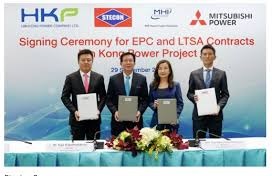Mitsubishi Power, a subsidiary of the Mitsubishi Heavy Industries (MHI) Group, has secured a full-turnkey contract for the engineering, procurement and construction (EPC) of a 1,400MW power plant in Thailand.
The contract has been awarded by Hin Kong Power Company, an independent power producer (IPP) in Thailand.
Hin Kong Power Company is a special purpose company (SPC) jointly established by RATCH Group Public Company and Gulf Energy Development Public Company.
Under the contract, Mitsubishi will supply two M701JAC gas turbines for the natural gas-fired turbine combined cycle (GTCC) facility.
The contract includes a 25-year long-term service agreement for the project.
As part of the agreement, Mitsubishi Power will provide maintenance on the power plant’s gas turbines to help ensure reliable operations.
The operations of the plant will begin from in March 2024 and January 2025 respectively
The power generated from the plant, to be built at about 100km west of Bangkok, will be sold to Electricity Generating Authority of Thailand, providing high efficiency, clean energy to support the power demand in the country.
Mitsubishi Power has been in a long association with RATCH Group. It has been providing power generating systems for steam power and GTCC power plants since the 1990s.
The company has also received four orders from Gulf Energy Development for GTCC power plants over the past decade.
With the latest project, Mitsubishi Power has supplied 22 gas turbines for RATCH Group and Gulf Energy Development projects. The total capacity of power generation facilities provided by Mitsubishi Power will be more than 15,000MW.
Mitsubishi Power said: “GTCC power plant is the cleanest and highest efficiency power generation alternative among systems that use fossil fuels. The high-temperature exhaust gas from the gas turbines is used to drive the steam turbine to produce electricity.
“Compared to conventional coal-fired thermal power plants, CO2 emissions can be reduced by 70%, providing an annual reduction of 7 million tonnes of CO2 from 1,400 MW of generating capacity.”





